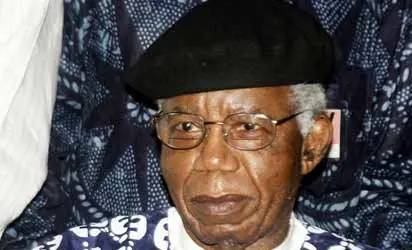My earliest encounter with Chinua Achebe was not the usual “suspect”; his trailblazing work, Things Fall Apart. That came a bit later. I had my earliest encounter with Africa’s greatest writer, with Chike And The River. It was set in Onitsha, against the backdrop of the majestic River Niger.
I had grown up literally on that river’s banks and learnt to swim in it; saw it carry away several people; ate from its rich resource of fish and turtle; witnessed how its peoples traded on huge canoes and boats and even remember vividly today, mythical tales about the powers of a river which dominated the lives of its peoples from the Futa Djallon right into the Nigerian creeks.
Achebe’s extraordinary power as a storyteller speaking to children, created a remarkable sense of drama and excitement when I first read the work in 1972.
The fact that he was talking about our great river, but setting his store against a human experience in the sprawling market town of Onitsha, far removed from the laid back reality of Jebba, made it even more compelling for my young mind.
As I said, Things Fall Apart came later and it became part of the necessary ensemble of readings that assisted us to understand the conflicts which the entire baggage of colonialism, including its spiritual, religious element, impacted upon the African personality.
It took the genius of Achebe to write Things Fall Apart, but the Africa of late colonialism and the whole sweep of anti-colonial struggle had provided the backdrop for the great ouvre. Achebe possessed that incredible ability to untangle the theme of his works in an accessible and lucid manner and for me that unpretentious approachability enhanced the enjoyment of the message that he was sending to the listener. His realism was one that could be mobilised in the cause of the African condition which dominated his works over the decades.
Last October, I did a two-part column on the very controversial book on his Biafran experience There Was A Country. It was clear to me that we were not likely to accept conclusions he drew out the tragic experiences of the 1960s in Nigeria, which culminated in the secession of Biafra. It was also true, that the experience and his role within it, burnt an imprimatur on his consciousness which made it difficult for him to accept post-Biafran, Nigerian citizenship again, for a long time. In my view, the book was cathartic and a final return to Nigerian citizenship, with all the contradictions that they conveyed.
It is significant that he had entered the Nigerian politics of the Second Republic, 1979-1983, as a member of Aminu Kano’s People Redemption Party (PRP), which was the most radical, left wing party of that period. I think that spoke volumes about the radical direction he felt Nigeria had to take, to find the liberation it deserved.
Chinua Achebe was Africa’s greatest writer by a mile, and it was not for nothing that Nelson Mandela said of him, that he was the writer, whose company broke the walls of imprisonment. His pioneering example cannot be over-praised for the incredible effect it would have on the literary landscape of our continent. One of my favourite African writers is NgugiWaThiong’o of Kenya and reading his essays we cannot escape his admiration for Achebe. Even at the human level, there was something modest about the man, despite his world-acclaimed success as a pioneer and writer. That modesty came to the fore when he responded to the adversity of losing the ability to walk after an accident.
He did not want to be pitied, reminding that there were people born deformed. He had walked for sixty years anyway and if he was confined to a wheelchair in his latter years, he was going to deal with it. And he did! He never stopped contributing to the betterment of our world from his wheelchair, since his great brain continued to function until he breathed his last. His works will endure through the ages and Chinua Achebe has found a worthy space in our hearts forever!
Post Views: 87


